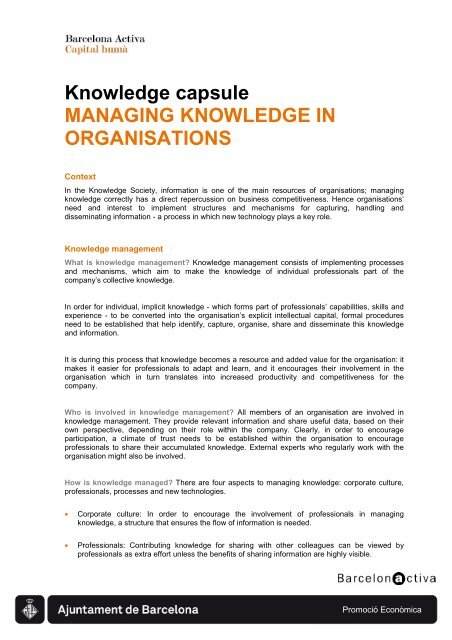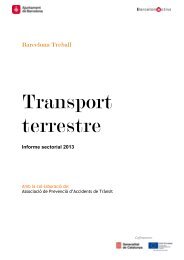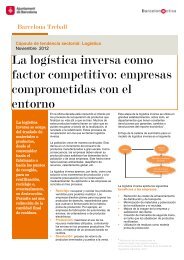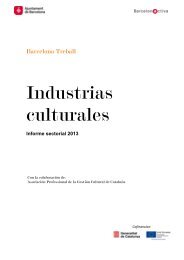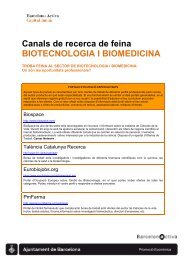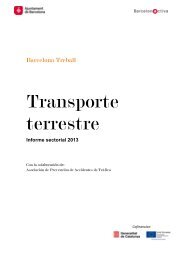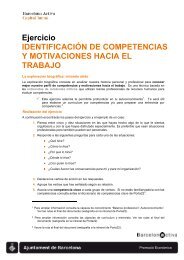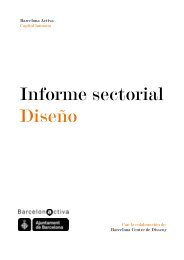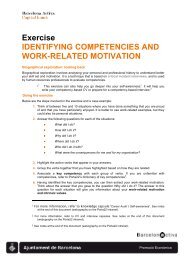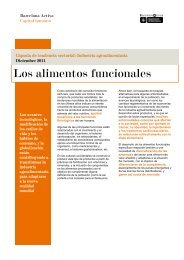Knowledge management
Knowledge management
Knowledge management
You also want an ePaper? Increase the reach of your titles
YUMPU automatically turns print PDFs into web optimized ePapers that Google loves.
<strong>Knowledge</strong> capsule<br />
MANAGING KNOWLEDGE IN<br />
ORGANISATIONS<br />
Context<br />
In the <strong>Knowledge</strong> Society, information is one of the main resources of organisations; managing<br />
knowledge correctly has a direct repercussion on business competitiveness. Hence organisations’<br />
need and interest to implement structures and mechanisms for capturing, handling and<br />
disseminating information - a process in which new technology plays a key role.<br />
<strong>Knowledge</strong> <strong>management</strong><br />
What is knowledge <strong>management</strong>? <strong>Knowledge</strong> <strong>management</strong> consists of implementing processes<br />
and mechanisms, which aim to make the knowledge of individual professionals part of the<br />
company’s collective knowledge.<br />
In order for individual, implicit knowledge - which forms part of professionals’ capabilities, skills and<br />
experience - to be converted into the organisation’s explicit intellectual capital, formal procedures<br />
need to be established that help identify, capture, organise, share and disseminate this knowledge<br />
and information.<br />
It is during this process that knowledge becomes a resource and added value for the organisation: it<br />
makes it easier for professionals to adapt and learn, and it encourages their involvement in the<br />
organisation which in turn translates into increased productivity and competitiveness for the<br />
company.<br />
Who is involved in knowledge <strong>management</strong>? All members of an organisation are involved in<br />
knowledge <strong>management</strong>. They provide relevant information and share useful data, based on their<br />
own perspective, depending on their role within the company. Clearly, in order to encourage<br />
participation, a climate of trust needs to be established within the organisation to encourage<br />
professionals to share their accumulated knowledge. External experts who regularly work with the<br />
organisation might also be involved.<br />
How is knowledge managed? There are four aspects to managing knowledge: corporate culture,<br />
professionals, processes and new technologies.<br />
• Corporate culture: In order to encourage the involvement of professionals in managing<br />
knowledge, a structure that ensures the flow of information is needed.<br />
• Professionals: Contributing knowledge for sharing with other colleagues can be viewed by<br />
professionals as extra effort unless the benefits of sharing information are highly visible.<br />
Promoció Econòmica
• Procedures: From this, the need arises for processes for contributing and sharing information to<br />
be intuitive and easy to use. This ensures that the information can be found quickly, without<br />
wasting time, thereby increasing confidence in the system.<br />
• Technology: The role of new technologies is fundamental in facilitating procedures and<br />
increasing the effectiveness of managing knowledge. Information technology can make it easy to<br />
update and structure information. Similarly, it enables information to be shared without the need<br />
for a physical meeting between the person that needs the information and the person that has it;<br />
it also enables them to access the information at the precise time they need it.<br />
There are a range of mechanisms and tools for managing information. The most common are e-mail,<br />
databases, blogs and virtual communities.<br />
Databases: Databases enable information and data to be stored in a clearly structured<br />
manner in different sections or categories - such as: “business objectives”, “best practice”,<br />
“results from projects” and so on.<br />
Virtual communities: Intranets enable virtual communities to be created or practical<br />
communities that virtually bring together professionals were shared interests.<br />
When is an organisation ready to implement knowledge <strong>management</strong>? For an organisation to<br />
implement knowledge <strong>management</strong> successfully, there are a series of requirements that are closely<br />
related to corporate culture:<br />
• The transfer of knowledge is not fluid in vertical organisations and rigid structures. <strong>Knowledge</strong><br />
<strong>management</strong> works across horizontal structures, where communication and exchange takes<br />
place in a fluid manner.<br />
• For people to be willing to share, an atmosphere of trust must be created where there is no<br />
distrust in sharing data and information and where contributions are recognised.<br />
• The organisational culture needs to promote ongoing learning and professional development in<br />
order to encourage professionals to expand their knowledge and skills.<br />
What are the advantages of knowledge <strong>management</strong> for organisations? Implementing an<br />
optimum knowledge <strong>management</strong> system has a positive impact in terms of professionals’<br />
effectiveness and, consequently, on the organisation’s competitiveness.<br />
• It encourages ongoing learning and professional development.<br />
• Among professionals, it promotes involvement and a sense of belonging to the company.<br />
• It reduces the time needed to resolve everyday queries.<br />
• It increases the company’s intellectual capital.<br />
• It promotes flow of communication between the organisation’s departments and professionals.<br />
• It helps identify leaders and experts within the organisation.<br />
• It encourages collaboration with professionals outside the organisation.<br />
• It maximises return on knowledge acquisition processes.<br />
• It contributes to better decision making.<br />
Year 2010 /Page 2
Conclusions<br />
• Organisational competitiveness in the <strong>Knowledge</strong> Economy depends increasingly on the<br />
intelligent use of information and the competitive application of technology.<br />
• For knowledge <strong>management</strong> to be successful in organisations, the following are key: a clear and<br />
simple system to record information; a corporate philosophy that promotes ongoing learning as a<br />
central core value of the organisation; and professionals being able to see the competitive<br />
advantages of contributing and sharing information.<br />
• New technologies play a key role in simplifying processes of storing and disseminating<br />
knowledge.<br />
Key concepts<br />
<strong>Knowledge</strong> <strong>management</strong>: A process consisting of all the activities that enable an organisation’s<br />
knowledge, information, experience and expertise to be generated, searched, disseminated, shared,<br />
used and maintained for the purposes of increasing the organisation’s intellectual capital and<br />
increase its value. UNE Standard 166,000 “Managing R&D&I; Terminology”<br />
A set of procedures aimed at capturing, handling and transferring information generated in a<br />
company or organisation and the intellectual capital of its members in order to create an ongoing<br />
system of training and improvement that has a positive impact on the quality of products and<br />
services offered.<br />
Systematic process of researching, identifying, selecting, structuring, storing, transferring and<br />
reusing an organisation’s tacit and explicit knowledge with the aim of converting it into an asset that<br />
generates value for the organisation.<br />
Intellectual capital: Set of personal, organisational, technological and relational competencies of an<br />
organisation upon which its competitive advantages depend.<br />
Set of intellectual skills and the tacit and explicit knowledge of the people that make up an<br />
organisation, and which can generate value for the organisation.<br />
Explicit knowledge: The information, data or experiences (the knowledge) that can be conveyed in<br />
formal language and in a systematic way.<br />
Implicit or tacit knowledge: Personal knowledge that is context dependent and is, therefore,<br />
difficult to communicate.<br />
Bibliography<br />
Year 2010 /Page 3
Canals, A. (2003). Managing <strong>Knowledge</strong>. Barcelona: Ediciones Gestión 2000, SA.<br />
Benavides Velasco, C.A.; Quintana García, C. (2003). Managing <strong>Knowledge</strong> and Total Quality.<br />
Madrid: Ediciones Díaz de Santos, SA.<br />
Equipo FeedBackGround, SL (2003). Guide to <strong>Knowledge</strong> Management. Barcelona: Centre for<br />
Business Innovation and Development. Department of Work, Industry, Trade and Tourism.<br />
Generalitat de Cataluña.<br />
Webography<br />
Infonomía. Innovators Network<br />
www.infonomia.com<br />
rrhh Magazine. Human Resources and Business Management<br />
www.rrhhmagazine.com<br />
Foundation for Human Resource Motivation<br />
www.factorhuma.org<br />
Managing <strong>Knowledge</strong><br />
http://www.gestion-conocimiento.com/<br />
Webography for Human Capital<br />
We offer a number of ways within the Human Capital website for you to expand the information<br />
relating to your self-understanding.<br />
Market > New Working Cultures > IT and 2.0 tools<br />
Market > New Working Cultures > Organisational Models/Business Management<br />
Use the SEARCH FACILITY for a more complete list of resources: books, articles and useful links.<br />
It’s very easy - simply open up SEARCH and enter a keyword.<br />
Year 2010 /Page 4


